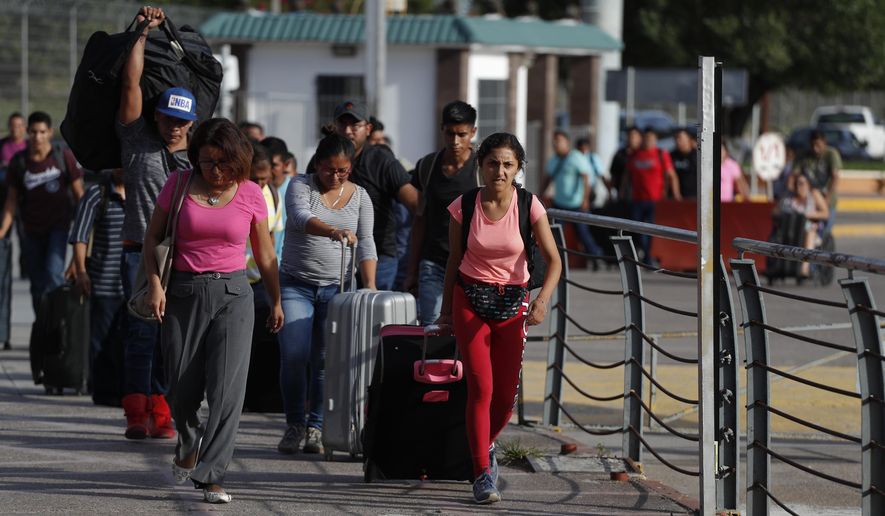The Biden administration cut corners in its rush to announce new rules extending work permits for foreigners in the U.S., including many illegal immigrants, and the divergence from standard procedures could imperil the legality of the policy.
Not only did Homeland Security dispense with the usual notice-and-comment period for new regulations, but the White House Office of Management and Budget, which gives final approval to rules, blew off a required meeting with stakeholders, according to would-be attendees.
“This entire regulatory effort is a complete disregard of the Administrative Procedure Act, and they’re doing this basically to cover their tracks and avoid accountability for a lot of the policies they’ve instituted,” said Robert Law, director of regulatory affairs at the Center for Immigration Studies, who requested the meeting to share feedback on the new policy.
The APA governs all major policy changes in the executive branch. The law has already tripped up the Biden team on several major immigration changes, including attempts to impose a 100-day deportation moratorium and to erase the Trump-era “Remain in Mexico” policy.
Mr. Law said the latest missteps could sink the new work authorization policy too.
“We’re exploring our options. They blew us off,” he said, adding that any out-of-work American seeking a job might also have standing to sue because of the competition he or she could face from those foreigners who will be granted new eligibility to work.
SEE ALSO: Democrats blast Biden over looming border surge
The rules, which were formally published this week in the federal register by U.S. Citizenship and Immigration Services, are intended to help the overworked Homeland Security agency to grant more permits. The permits are used by refugees, asylum-seekers and a broad category of people who were illegal immigrants but who have obtained some tentative status, such as “Dreamers.”
Work permits currently have an automatic 180-day extension if they are slated to expire before USCIS can process a renewal. The new rule would expand that to a 540-day automatic extension — nearly an extra year of time.
USCIS says it’s too swamped with requests to go through the usual process for vetting renewals. It said as many as 375,545 people will get the extra year extension.
“This rule is not making additional categories eligible for employment authorization; it simply temporarily increases the 180-day timeframe for those already eligible for an automatic extension,” USCIS said in its regulatory filing.
The agency said American workers won’t suffer, since the eligible population is less than a quarter of 1% of the U.S. labor force. But keeping migrants in jobs could reduce the burden they would place on family, friends and aid organizations.
Mr. Law says the agency wants the rule so it can focus attention on granting more permits to newcomers. He said USCIS is facing a crush of new applications because the Biden administration has expanded the number of illegal immigrants with tentative legal status, so more people are eligible to apply.
He wanted to offer that perspective — something he said he has the right to do under the laws governing how regulations are issued.
In this case, since USCIS skipped over the public comment period, Mr. Law tried to make his voice heard when the regulation went from Homeland Security to the White House Office of Management and Budget, which gets a final crack at every regulation before it is finalized.
Under a 1993 executive order, while OMB’s Office of Information and Regulatory Affairs is reviewing a rule, it is supposed to allow any member of the public to request a meeting. So that’s what Mr. Law and a colleague did.
They got a confirmation of a telephone meeting set for April 22. When the day arrived, they jumped on the call, but there was nobody from OMB to open the meeting. Without a host, the call kept kicking them off after five minutes, but they kept calling back in.
“Eventually it gets to about 3:30, 3:35, we said we’ve done enough to say we’re here, they’re just not coming,” Mr. Law recounted. A follow-up email to OMB also produced “crickets.”
Then sometime last week, the rule disappeared from the OIRA website, meaning it had been sent back to USCIS, which formally announced it Tuesday.
OIRA on its website lists the April 22 meeting as “completed.”
Neither the agency, nor the OIRA official who scheduled the meeting, responded to inquiries from The Washington Times for this story.
Mr. Law was previously policy chief at USCIS during the Trump administration and has been part of the regulatory process from the agency’s side of things. He said the government could have attended the meeting and said nothing, and that would have checked the box. But by not attending, officials violated regulatory procedures and opened themselves to legal challenges.
USCIS declined to comment on the missed meeting, but in a statement to The Times it defended its decision to short-circuit the full public comment process, saying it met the “good cause” exception to regular rule-making. The agency said the good cause was the hardship immigrants would face over lost jobs.
Mr. Law said it was the agency’s own poor decision-making that left it swamped with work.
“That is not a good cause justification to bypass notice and comment,” he said.
Immigration-rights groups cheered the move.
The American Immigration Lawyers Association called the change an “easy ’plug-and-play’ change” that will give immigrants assurances they won’t lose their jobs.
“Through no fault of their own, crushing processing backlogs have caused work-authorized foreign nationals to lose jobs and employers to lose valuable talent at a time when there is a labor market shortage,” said AILA President Allen Orr.
USCIS issued the policy as a “temporary final rule,” which means that while it skipped over the public comment period before, it will now welcome those thoughts — although the policy is already being implemented.
• Stephen Dinan can be reached at sdinan@washingtontimes.com.




Please read our comment policy before commenting.